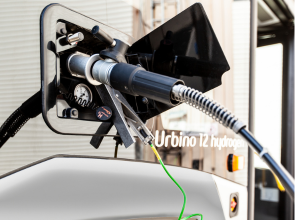Hyzon Motors to launch hydrogen powered garbage and tow trucks

The makers of Australia’s first locally designed and built hydrogen-powered truck say it will be towing cars and potentially collecting garbage this year in a rollout they believe could spur a shift away from highly polluting diesel vehicles.
Hyzon Motors says the 27-tonne truck it will unveil at its headquarters in Noble Park, in Melbourne’s south-east, on Monday is an Australian first and shows the trucking industry can go green.
“We’re making it very clear that we’ve got a product now, the first product that’s been designed locally, that’s ready to go into market,” said John Edgley. “That will give more confidence that actually we can start transitioning these big fleets in companies that have thousands and thousands of these trucks.”
Electric models made up 10 per cent of new car sales globally last year, but heavy vehicles have been harder to turn green. The US-headquartered Hyzon is one of several start-ups betting that hydrogen fuel cells are a more viable option than rechargeable batteries, which are large and heavy, and need downtime for recharging.
Edgley said the truck would go into commercial trials this year, with three on order from the RACV-owned towing company Nationwide Group, and discussions under way with waste management groups and other potential operators.
Hyzon’s team designed and built the first three trucks over the past year, replacing the diesel engines in new Mercedes trucks with hydrogen gas tanks and a fuel cell. They ran the first vehicle at Holden’s former proving ground in Lang Lang, near French Island, over summer.
Hyzon has contracts to deliver prime movers to Coregas in NSW and Ark Energy in Queensland, and is preparing to break ground on a 10,000-square-metre manufacturing facility at its Noble Park site through a partnership with the RACV. The facility will have the capacity to produce 1000 trucks a year when it opens in 2024.
Hydrogen fuel cells generate electricity by splitting molecules in hydrogen gas, producing water vapour as the only byproduct. The gas is made through a process called electrolysis, in which electricity splits water into hydrogen and oxygen. If made with solar, wind or other clean power, “green hydrogen” is considered a renewable energy, one which backers say may be the key to cutting emissions in sectors such as manufacturing, freight and aviation.
Edgley said the cost of hydrogen would have to come down for it to be a viable alternative to diesel, but that would happen as more than 100 production projects announced across Australia started to come online.
He said the RACV and Hyzon planned to make their own solar-powered green hydrogen at the Noble Park site, and other fleet operators could adopt that type of self-sufficient hydrogen fuel production out of their own depots.
Neil Taylor said the organisation was “looking forward to trialling Hyzon-built hydrogen tow trucks, starting in 2023”.
